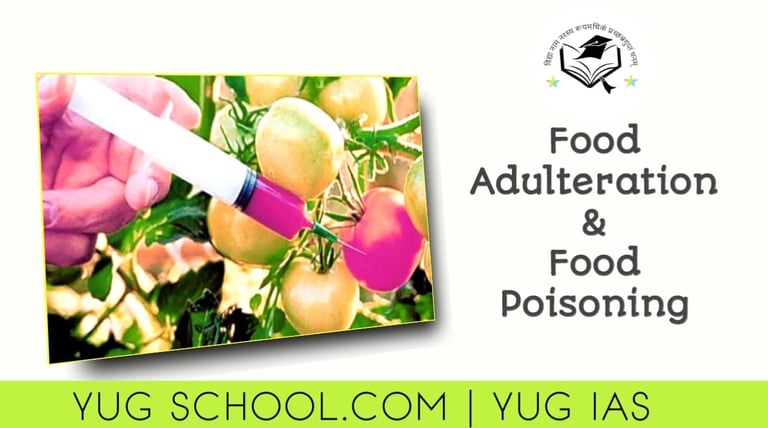Food Adulteration and Food Poisoning
Food adulteration is the illegal practice of adding inferior or harmful substances to food to make it appear better or last longer
HOME SCIENCE


Food adulteration is the illegal practice of adding inferior or harmful substances to food to make it appear better or last longer. This can have serious health consequences for consumers, including food poisoning.
How Food Adulteration Can Lead to Food Poisoning
Contamination: Adulterants can introduce harmful bacteria, viruses, or parasites into food, which can cause foodborne illness.
Toxic substances: Some adulterants, such as chemicals or pesticides, can be directly poisonous when ingested.
Allergic reactions: Adulterants can sometimes trigger allergic reactions in people who are sensitive to certain substances.
Examples of Food Adulteration
Adding water to milk
Replacing expensive ingredients with cheaper substitutes
Adding preservatives to extend the shelf life of food beyond safe limits
Adding artificial colors to fruits and vegetables: These colors may not be safe for consumption and can cause allergic reactions in some people.
Using rotten or spoiled ingredients: This can lead to the growth of harmful bacteria and mold, which can cause food poisoning.
Adding bulking agents to processed foods: These fillers are often low in nutrients and can replace healthy ingredients.
Symptoms of Food Poisoning
Nausea
Vomiting
Diarrhea
Abdominal cramps
Fever
Headache
Preventing Food Adulteration and Food Poisoning
Buy from reputable sources: Choose to buy food from stores that have a good reputation for food safety.
Look for tamper-evident packaging: Make sure that food packaging is sealed and undamaged.
Wash fruits and vegetables thoroughly: This can help to remove dirt, bacteria, and pesticides.
Cook food properly: Cooking food to the proper temperature can kill harmful bacteria.
Store food safely: Refrigerate or freeze perishable foods promptly.
Be aware of food recalls: Check the websites of food safety agencies for information about food recalls.
By following these tips, one can help to reduce his risk of food poisoning from adulterated food.
It is important to note that not all food adulteration is harmful. Some common practices, such as adding vitamins to milk or bleaching flour, are considered safe and beneficial.
